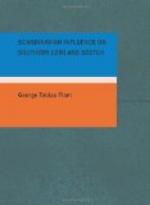MISTER, sb. and vb.
need, from O. Fr. mestier, not from
O.N. miste,
which always means “to lose,” as it does
in the
modern diall.
The O. Fr. mestier meant “office, trade,”
and
sometimes “need.”
The last is the meaning of the modern
metier
in the dialects of Normandy. Both meanings exist
in
Northern English.
OUKE, sb. week.
In all probability from O.E. wucu by loss of
initial w
before u. The Dan. uge does not
quite
correspond.
The O.N. vika even less. The Danish uge
simply
shows similar
dropping of w (v) as the Sco. word.
RIGBANE, sb. backbone.
Both elements are Eng. The compound
finds a parallel
in Norse rygbaein.
SOOM, vb. to swim.
Not Dan. soemme, but loss of w before
oo, cp.
the two Norse forms svoemma and symma.
Cp.
soote,
the last word in the first line of the Prologue to
Chaucer’s
Canterbury Tales.
TEEM, vb. to empty.
It is not necessary to derive this from
Norse toemme,
“to empty.” There is an O.E. t[-o]m
from
which the Sco.
adj. toom probably comes. Toom is also
a
verb in Sco. Teem
is simply this same word by characteristic
Sco. change of
o to e. (See Sec.17.) This also explains
the
length of the
vowel.
TRAK, vb. to pull,
not necessarily Norse trekka, cp. the
L.G. trekken.
WID, sb. wood.
Not O.N. viethr nor Dan. ved. The
vowel is
against it in
both cases. But just as above toom becomes
teem, so
wood > wid, cp. Sco. guid,
“good,” pit,
“put,”
etc. (See Sec.17.) Hence also the shortness of
the vowel
in wid.
WERE, sb. spring, cp.
Latin ver. Var, vaar in Scand.
does not account
for the e in the Sco. word.
YIRD, sb. earth. Not from Dan. jord. See next word.
YIRTH, sb. earth, an
inorganic y (see Sec.18). Not from O.N.
joereth.
For d in yird see Sec.19.
24. LOANWORD TESTS.
I have adopted the following tests of form, meaning and distribution in determining the Scand. source of loanwords:
1. The diphthong ou, ow corresponding to O.N. ou, O.E. ea.
2. Ai, ay corresponding
to O.N. aei, O.E. [-a] as far as
such words can be determined from modern
dialects according to
Sec.20.
3. The spirant th corresponding to O.N. eth, and O.E. d.




